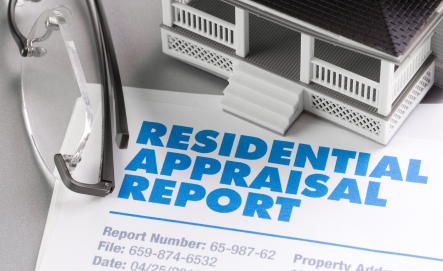Understanding Your Purchase Appraisal
 Once you have a property under contract and you’ve performed an inspection, it’s time for your loan officer to secure a purchase appraisal.
Once you have a property under contract and you’ve performed an inspection, it’s time for your loan officer to secure a purchase appraisal.
Be aware that an appraisal will almost always render a lower value than you determined in your comparative market analysis, for a number of reasons. Appraisals do not give an accurate market value – they simply give you a reflection of what you’re trying to accomplish with the bank. There are actually different types of appraisals, and each one serves a different purpose.
About 95 percent of purchase appraisals come in at the purchase price, regardless of the actual value of the property. With every financed investment purchase, there are three parties that are trying to reconcile: the investor, the appraiser, and the bank. Each party has a different agenda.
Since lenders provide the money, they have the greatest say in this process. Their purpose is to detect loan fraud. They want to see an appraisal close to the sale price because major discrepancies between those two figures are red flags. If an appraisal comes in too low, they won’t give you the loan. If it comes in too high, they worry about double contracts (double-closing), which are a common form of fraud. In fact, if your appraisal is more than 10 percent higher than the listing price, they will probably demand that you disclose this fact to the seller and have them write a letter to the bank explaining why they’re selling their home for far less than it appraises for. As you can imagine, this can jam up the process. Ultimately, the purchase appraisal confirms to the bank that the home is worth at least what you are paying for it, not what the home is actually worth.
Because of strict regulations, appraisers are actually required to throw out any comparables (“comps”) that show a 10 percent difference in price as compared to the home being purchased. Appraisers must meet rigorous requirements to become certified. Because the industry is so regulated, their agenda is to produce an appraisal that will satisfy banks. Your property could be the deal of the century, but this probably won’t be reflected in your appraisal. Don’t be discouraged if your appraisal comes in lower than you hoped for. Appraisals are only valid for three to six months anyway, and since I usually hold properties for years, I don’t derive a lot of value from appraisals.
Appraisal regulations can have a significant impact on fix-and-flip homes, but they are not a major factor in a long-term buy-and-hold strategy. Not only are appraisers unable to show values much higher than purchase prices, but they are also bound by time. It’s unlikely that they will give you an appraisal for $200,000, and then turn around and appraise the same home for $280,000 in two months, no matter how much work you’ve put into it. That would send a red flag to your lender. In fact, this is one of the major factors that makes flipping so risky – it’s predicated on you making a quick profit, and lending regulations make it extremely difficult for you to substantiate large increases in home values in the timeline you need.
Contrary to common belief, a comparative market analysis (CMA) provides a much more accurate market value than do purchase appraisals. If you’re a longer-term buy-and-hold investor, you don’t need to worry about your appraisal coming in lower than the market value determined by your comparative market analysis.
The main point here is this: Don’t be scared away from deals by lower appraisals. Remember that the purchase appraisal only confirms to the lender the value they want to see for specific purposes.
Know the market, perform accurate research, and trust your research and CMA.
 |
Marco Santarelli | Company Website | LinkedIn Connect | Marco Santarelli is an investor, author and founder of Norada Real Estate Investments — a provider of passive turnkey investment properties in growth markets around the United States. For investment opportunities please visit www.NoradaRealEstate.com |



